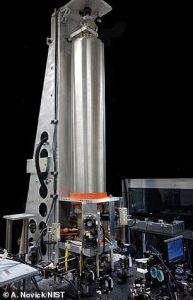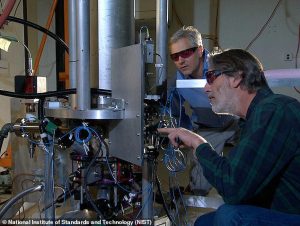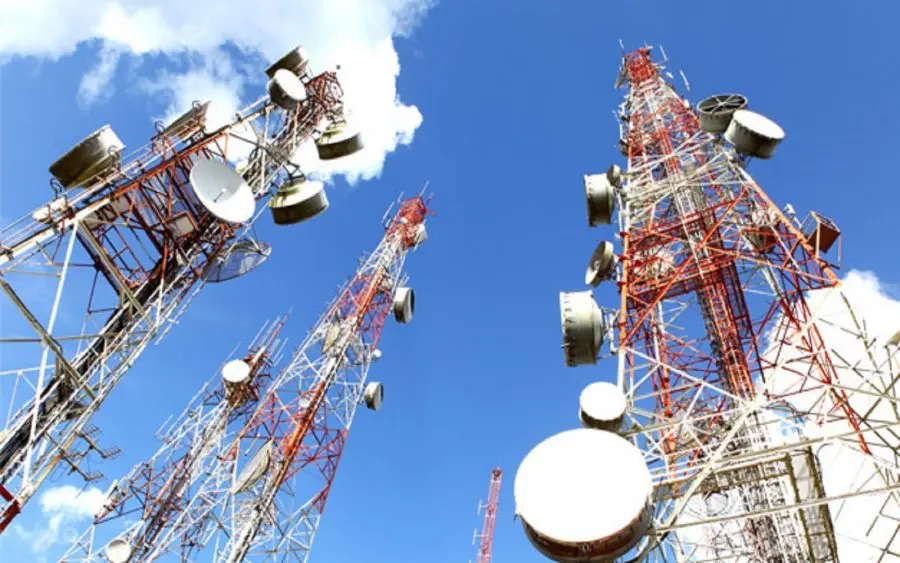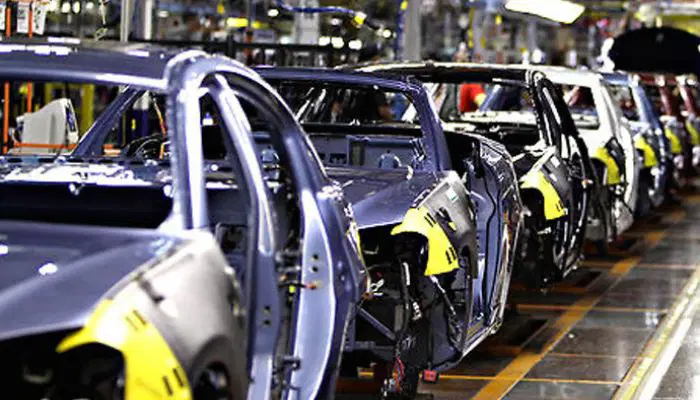Tech
Top secret lab is developing the UK’s first quantum clock
Published
3 months agoon
By
Ekwutos Blog
- READ MORE: Google’s quantum chip can perform ‘impossible’ tasks in five mins
A top secret lab is developing a super-precise ‘quantum clock’ that could revolutionize British intelligence.
This super-accurate timekeeping device, to be rolled out by 2029, will allow more precise navigation and surveillance on Royal Navy ships and RAF planes.
It will also ‘enhance the accuracy of advanced weapons’ like guided missiles and give British computer boffins the edge over online adversaries like cyber criminals.
The clock’s precision will be so refined that it will lose less than one second over billions of years, allowing scientists to measure time at an unprecedented scale.
It is the first device of its kind to be built in the UK and will be deployable on military operations in the next five years, according to Defence Science and Technology Laboratory (DSTL).
‘This first trial of advanced atomic clock represents a significant achievement in the UK’s quantum technology capabilities,’ said DSTL chief executive Paul Hollinshead.
‘The data gathered will not only shape future defence effort but is also a signal to industry and academia that we are serious about exploring quantum technologies for secure and resilient operational advantage.’
Quantum clocks use quantum mechanics – the physics of matter and energy at the atomic and subatomic scale – to keep time with unprecedented accuracy by measuring energy fluctuations within atoms.

Developed at the top-secret Defence Science and Technology Laboratory, (Dstl) the quantum clock will improve British intelligence and surveillance by decreasing the reliance on GPS technology, which can be disrupted and blocked by adversaries

To be rolled out by 2029, the quantum clock will allow more precise navigation and surveillance on Royal Navy ships and RAF planes. Pictured, Royal Navy Duke class Type 23 anti-submarine frigate HMS Portland
Quantum clocks are even more accurate that the ‘atomic clocks’, of which there are approximately 400 already in operation around the world.
The UK already has an atomic clock at the National Physical Laboratory in London, but this quantum clock will be the country’s first.
Nick France, CTO of Sectigo, told MailOnline: ‘A quantum clock is a type of atomic clock – essentially a super-accurate timekeeping device.
‘Atomic clocks work by measuring the resonant frequency of atoms, whereas quantum clocks measure very small energy changes (‘quantum fluctuations’) in these atoms, leading to increased accuracy even over super-accurate atomic clocks.
‘Atomic clocks currently are incredibly accurate anyway, but a quantum clock has accuracy levels where only a single second is lost in billions of years of operation.’
The British quantum clock will be ‘the first device of its kind to be built in the UK’, said the UK government in a statement, but it will not be a world first.
Back in 2010, the University of Colorado at Boulder developed a quantum clock with the US National Institute of Standards and Technology.
However, key barriers to deploying quantum clocks are their size – current models come in a van or in a car trailer and are about 1,500 litres in volume.

Atomic clocks use certain resonance frequencies of atoms to keep time with extreme accuracy. Pictured, atomic clock at the University of Colorado Boulder in the US

Back in 2010, the University of Colorado at Boulder developed a quantum clock with the US National Institute of Standards and Technology (pictured)

Pictured, NIST-F1, source of the official time of the USA
Potential of quantum clocks
- Enable more precise and independent navigation systems, reducing reliance on GPS satellites, which are vulnerable to jamming or destruction in conflict scenarios.
- Secure communications systems, such as encrypted military networks, which depend on highly synchronised timekeeping.
- Enhance the accuracy of advanced weapon systems, like guided missiles, which rely on accurate timing to calculate trajectories and coordinate attacks.
- Allow Armed Forces to gain an edge over adversaries in timing-critical operations, especially in areas like cyber warfare, where milliseconds can make a difference.
Source: DSTL
Just like most quantum equipment, quantum also have sensitivity to environmental factors such as heat and air molecules, limiting their transport between different places.
‘Quantum clocks are not small like watches or alarm clocks,’ France added.
‘These are devices that in current implementations can be large, even room-sized devices.
‘However, improvements in technology will decrease the size of these devices making them more portable.’
Apart from just ultra-precise timekeeping, quantum clocks could transform global navigation systems by helping satellite communications and aircraft navigation.
According to DSTL, their quantum clock will enable more precise and independent navigation systems, reducing reliance on GPS satellites, which are vulnerable to jamming or destruction in conflict scenarios.
It will improve communications systems, such as encrypted military networks, which depend on highly synchronised timekeeping, as well as boosting the accuracy of advanced weapon systems like guided missiles, which rely on accurate timing to calculate trajectories and coordinate attacks.
What’s more, British Armed Forces will get an edge over adversaries in ‘timing-critical operations’, such as cyber warfare, where milliseconds can make a difference.

Coordinated Universal Time (UTC) is defined by sophisticated, ultra-precise ‘atomic clocks’ around the world, which tick precisely and continuously. Experts are pictured here with the NIST-F2 atomic clock in the US
Cyber warfare refers to the actions by a nation-state or international organization to attack and attempt to damage another nation’s computers or information networks.
France told MailOnline: ‘Super-accurate timekeeping is important to governments and militaries to enable accurate navigation (using GPS or similar technologies) of planes and ships, but also guidance of weapons systems such as missiles.
‘Equally important to the military as well as civilians is secure communications.
‘Much of the secure communications for governments and the military relies on accurate time sources to function.
‘But equally these accurate clocks are useful for more civilian applications and general internet security, even securing your personal data as it’s transmitted around the internet.’
Companies and governments around the world are keen to cash in on the huge potential benefits that the spooky effects of quantum technology could bring.
Google last month unveiled a new quantum computing chip it said could do in minutes what it would take leading supercomputers 10 septillion years to complete.
Eventually, such a chip could power a ‘commercial’ quantum computer that could be purchased by members of the public and used in labs, offices and even homes.
These ultra-powerful machines, which use the spooky effects of quantum physics, could do everything from speed up AI, solve climate changeand discover lifesaving drugs.
WHAT IS THE ATOMIC CLOCK?
Atomic clocks have a timekeeping mechanism that use the interaction of electromagnetic radiation with the excited states of certain atoms.
The devices are the most accurate system we have for measuring time, with consistent standards applied.
They are the primary standards for international time distribution services, and uses to control wave frequency for TV, GPS and other services.
The principle is founded in atomic physics, measuring the electromagnetic signal that electrons in atoms emit when they change energy levels.
Modern versions cool atoms to near absolute zero by slowing the atoms down with lasers. With temperature of atoms driving their accuracy.
Every few years a ‘leap second’ is added to atomic clocks, by effectively stopping them for a second, to keep them in line with Earth’s rotation speed.
You may like


Access Holdings posts N642bn profit after tax, 88% gross earnings growth


Nigeria, Japan deepen rice production partnership


Declare state of emergency on your presidency, Nigeria collapsing – Atiku tells Tinubu


Nigeria, South Africa strengthen energy ties to curb continental energy deficit


When the Time Comes, We’ll Handle Wike… Azikwe used to say Surulere” — Ex-Governor Ada-George Drops Bombshell, Channels Azikiwe’s Spirit Amid Rivers Crisis


BREAKING: 8 Killed in Boko Haram IED Attack Along Maiduguri-Damboa Road
Tech
They only know how to drain data’ – Telecom consumers lament tariff hike, poor network
Published
3 days agoon
April 14, 2025By
Ekwutos Blog
Some telecommunication services consumers in the Federal Capital Territory, FCT have urged Mobile Network Operators to improve their services to match the recent hike in their tariffs.
They made the call in separate interviews with NAN on Monday in Abuja.
The subscribers said despite the increase in subscription rates mobile networks could remain epileptic for hours.
In a publication dated February 6, 2024, the Executive Vice-chairman of the Nigerian Communications Commission, Dr Aminu Maida, said that the commission would hold service providers accountable for poor service delivery.
Mr Ogah Paul, one of the subscribers said he had enough data on his network but could not access the internet because of the epileptic network.
He urged service providers to fix the problems surrounding the poor services.
“The only thing they know is to drain data without any good service delivery. I feel like crying because of a problematic network. I have been receiving server errors since morning.
“To even download and watch a video sent to me since, takes me almost one whole day. “I wonder if members of staff of the service providers are enjoying the service they render to us.
“We cannot make calls, access the internet or even receive calls,’’ he said.
According to him, unfortunately, the network providers put up some of the best adverts about their products and services which they cannot meet.
Mr Victor James, another subscriber said he had enough data but was not able to use it to his satisfaction.
“Why does their data plan not reflect immediately when you buy data? Sometimes it takes as much as 24 hours to reflect.
“I am tired of this. The network is really bad. I have enough data but I cannot use it the way I want.
“I hope the issues get resolved as soon as possible so that I can access my data without further delay,” he said.
However, Ms Josephine Tanko, told NAN that she had no problems with her network providers.
“It is fast and reliable. I think it is the network that gives the best internet speed and quality.
“It will always be my best that is why I will always choose it over any other network,” she said.
She called on networks that did not meet their subscriber’s expectations to ensure that they improved their services.

By Adegboyega Adeleye
The importance of cars in transportation cannot be overemphasised with some countries known for their production.
Transportation is required for work, school, and industry, with car production fast becoming a major producer of revenue and a player in the global was financial market.
Car production is one of the largest economic sectors internationally; however, some countries produce more cars than others. The list of countries by motor vehicle production is based on statistics by the International Organization of Motor Vehicle Manufacturers.
The world’s car manufacturers put another 93.5 million vehicles on the roads in 2023, the last full-year numbers currently available.
This article will explore the top 5 countries with the highest car production.
1. China
China, the world’s biggest manufacturer overall, leads the world in car production. The country’s 2023 production totaled more than 30 million vehicles, adding up to more than 30% of all cars and trucks produced globally.
The largest domestic car manufacturers in China, known as the traditional “Big Four,” are SAIC Motor, Dongfeng, FAW, and Chang’an.
2. United States
The United States–a major automotive producer, known for its large vehicle market–is the second biggest auto manufacturing country with a volume of 10,611,555. This represents about 5.5 percent growth compared to the 10,060,339 produced in 2022.
The United States produces less than half of what China does, having manufactured about 1.8 million cars and 8.3 million commercial vehicles in 2022. The United States’ largest car manufacturers, referred to as the “Big Three,” are General Motors, Ford Motor Company, and Fiat Chrysler.
3. Japan
Japan ranked as the third biggest automobile-producing country in the world with a total volume of 8,997,440 vehicles manufactured in 2023. The country is a significant player in the global automotive industry, known for its engineering and quality.
After a sudden drop in production from 2020-2022 due to the COVID-19 pandemic, Japan produced just under 9 million vehicles in 2023 (8,997,440)–a drop from its pre-COVID total of nearly 9.7 million in 2019.
However, the volume grew by 14.8 percent compared to the 7,835,519 produced in 2022.
Japan’s automotive industry is one of the largest industries in the world. The country’s automotive manufacturers include Toyota, Honda, Daihatsu, Nissan, Suzuki, Mazda, Mitsubishi, Subaru, Isuzu, etc.
4. India
India is the fourth-largest automobile-producing country in the world with a total number of 5,851,507 manufactured in 2023. The volume of vehicles grew by 7.2 percent compared to 5,456,857 vehicles produced in 2022.
Although, India is not renowned in America or Europe as a vehicle manufacturer, the Asian nation produced 5.8 million cars in 2023– an annual increase of 7%. India’s export markets for vehicles include Saudi Arabia, South Africa, and Mexico.
The nation is rapidly growing as an automotive market and producer.
5. South Korea
South Korea is the fifth-largest auto-producing country in the world. The country manufactured a total of 4,244,000 vehicles in 2023, representing a growth of 13 percent from a total of 3,757,049 vehicles produced in 2022.
The major South Korean automobile manufacturers include GM Korea, Hyundai Motor Group and its affiliate, Kia Corporation along with Renault Korea Motors.
Tech
A lot of people don’t know this but do you know that all your internet connections and services are powered by Glo, not all but majority is powered by an under see cable called GLO1 THAT’S owned by Glo1.
Published
4 days agoon
April 13, 2025By
Ekwutos Blog
Now because they make more money from this than selling as retailers that’s why they don’t care about their ISP SERVICE in retail quantities.
It’s like a bakery, they are most focused on selling to bulk buyers than single house hold user’s.
So you MTN, GLO AND ALL THAT are mostly connected to GLO1 even banks and may other platforms.
Ok let me break everything down.
1. Glo’s GLO-1 Cable:
GLO-1 is a private submarine cable owned by Globacom. It stretches from Nigeria to the UK and connects several West African countries. It was Nigeria’s first privately owned international submarine cable, launched around 2010.
Key Facts about GLO-1:
• Length: Over 10,000 km.
• Capacity: Designed for up to 2.5 Tbps.
• Landfall points: UK, Portugal, Senegal, Côte d’Ivoire, Ghana, and Nigeria.
• Purpose: Meant to reduce dependence on SAT-3 and provide high-speed internet capacity.
⸻
2. Why Glo May Not Focus Heavily on Retail ISP Services:
Glo essentially plays two roles:
• Infrastructure owner (wholesaler)
• Internet provider (retailer)
The wholesaling of the GLO-1 cable (and other bandwidth infrastructure) can be significantly more profitable and less stressful than managing millions of data subscribers in Nigeria with high expectations and poor last-mile infrastructure.
So yes:
Glo likely focuses more on selling bulk bandwidth to big clients than pleasing end users.
⸻
3. Who Are Glo’s GLO-1 Subscribers (Wholesale Clients)?
These can include:
• Telecom companies: ISPs, other mobile network operators.
• Banks and financial institutions.
• Tech companies and data centers.
• Government institutions.
• Educational institutions (for broadband research/academic access).
• CDNs and enterprise clients (e.g., Netflix, Google, Meta might use transit partners who tap into GLO-1).
4. How Many Submarine Cables Does Glo Own?
• Only One: GLO-1 is the only submarine cable Globacom directly owns.
• However, Glo might lease or partner to access others like:
• SAT-3 (older system, via NITEL/NTEL)
• ACE, WACS (via partnerships or regional consortiums)
So , Glo’s focus on being a wholesale bandwidth provider through GLO-1 might be one reason why their retail ISP service suffers in terms of customer satisfaction. They’re likely making more consistent revenue selling to institutions, ISPs, and data centers than from individual subscribers who demand high-quality, stable data service — which requires serious investment in towers, backhaul, and customer service
Copyright of Isaac Rocks Adeiza (Original Owner must be tagged to any Redistributions of content)
Content can’t not be redistributed for profit purposes.

Access Holdings posts N642bn profit after tax, 88% gross earnings growth

Nigeria, Japan deepen rice production partnership

Declare state of emergency on your presidency, Nigeria collapsing – Atiku tells Tinubu
Trending

 Trending6 months ago
Trending6 months agoNYA demands release of ‘abducted’ Imo chairman, preaches good governance
- Business6 months ago
US court acquits Air Peace boss, slams Mayfield $4000 fine

 Politics6 months ago
Politics6 months agoMexico’s new president causes concern just weeks before the US elections
- Entertainment6 months ago
Bobrisky transferred from Immigration to FCID, spends night behind bars
- Entertainment6 months ago
Bobrisky falls ill in police custody, rushed to hospital

 Politics6 months ago
Politics6 months agoRussia bans imports of agro-products from Kazakhstan after refusal to join BRICS

 Politics6 months ago
Politics6 months agoPutin invites 20 world leaders
- Politics1 year ago
Nigerian Senate passes Bill seeking the establishment of the South East Development Commission.

